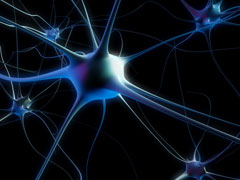Nerve cells after brain injury and disease

Researchers from The Hospital for Sick Children and Sunnybrook have identified a receptor that prevents these nerves from regenerating in the adult nervous system.
Why they don't regenerate after brain injury and disease
Finding treatments for injuries and diseases involving the brain and spinal cord can make an already-difficult situation even more challenging, because once nerves from the central nervous system are damaged they don't normally regenerate.
Understanding why this occurs can shed light on possible ways to repair the injured brain or spinal cord.
Researchers from The Hospital for Sick Children and Sunnybrook have identified a receptor (a structure on the surface of the cell that binds to specific proteins) that prevents these nerves from regenerating in the adult nervous system. This team set out to find what role this receptor plays in the adult brain.
"The results surprised all of us. We found that when put into play, these receptors didn't just prevent regeneration - they actively killed axons," says Dr. Freda Miller, the study's co-principal investigator, a Senior Scientist at SickKids and Professor in the Department of Molecular Genetics at the University of Toronto. "If this is an active process and we can understand the network of proteins involved, we could intervene and prevent the axons from being destroyed."






